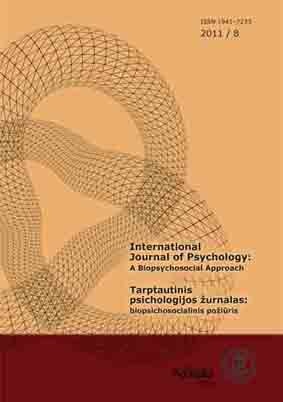Išnešiotų trijų–keturių mėnesių kūdikių žindymą po gimimo prognozuojantys veiksniai
Predictors of the Full -Term Infants’ Breast-Feeding at the Third -Fourth Month after Birth
Author(s): Giedrė Širvinskienė, Roma Jusienė, Nida Žemaitienė, Rima Breidokienė, Eglė MarkūnienėSubject(s): Psychology
Published by: Vytauto Didžiojo Universitetas
Keywords: žindymas; sociodemografiniai veiksniai; biomedicininiai veiksniai; psichologiniai veiksniai; pogimdyminis depresiškumas; breast-feeding; socio-demographic factors; biomedical factors; psychological factors; postnatal depression
Summary/Abstract: Įvairūs tarptautiniai tyrimai rodo, kad žindymas teigiamai veikia kūdikio sveikatą ir raidą, motinos sveikatą, motinos ir kūdikio ryšį. Pasaulinė sveikatos organizacija rekomenduoja išimtinį kūdikio žindymą iki šešių mėnesių amžiaus. Šio tyrimo tikslas yra ištirti sociodemografinius, biomedicinius ir psichologinius veiksnius, susijusius su trijų–keturių mėnesių kūdikių maitinimo būdu, ir atskleisti, kurie iš jų didina tikimybę, jog kūdikis bus žindomas. Metodika. Tyrime dalyvavo 223 moterys, pagimdžiusios išnešiotus naujagimius Kauno medicinos universiteto klinikose. Psichologinis vertinimas vyko 2-3 dieną po gimdymo ir praėjus 3–4 mėnesiams po gimdymo. Pirmojo vertinimo metu tyrimo dalyvės pateikė informaciją apie patirtus stresinius įvykius, savijautą ir santykius su sutuoktiniu / partneriu nėštumo metu. Antrojo vertinimo metu tyrimo dalyvės teikė informaciją apie kūdikio maitinimo būdą, patirtus stresinius įvykius, savijautą ir santykius su sutuoktiniu / partneriu per tris mėnesius po gimdymo. Abiejų vertinimų metu jos apibūdino savo emocinę būseną pagal Edinburgo postnatalinės depresijos skalę. Be to, buvo analizuojama medicinos personalo pateikta informacija apie gimdymo būdą ir aplinkybes, naujagimio svorį ir funkcionavimą pagal Apgar skalę. Extensive research provides evidence that breast-feeding has advantages for infant health and development, maternal health and infant-mother relationship. The WHO recommends exclusive breast-feeding up to 6 months of age. However the proportion of infants who are exclusively breast-fed declines during the first several months after birth. The purpose of the present study is to identify socio-demographic, biomedical and psychological factors associated with and predicting breast-feeding 3-4 months postpartum. Material and methods. Participants were 223 women who gave birth to their full-term infants at the Hospital of Kaunas Medical University. Psychological measurements were accomplished two-three days and three-four months postpartum. During the first measurement of the study participants provided information about the experienced stressful events, emotional well-being and relationships with spouse / partner during pregnancy. During the second measurement participants provided information about infant feeding mode, experienced stressful events, emotional wellbeing and relationships with spouse / partner within three months after giving birth. In both measurements participants assessed their emotional state using Edinburgh postnatal depression scale. The information about the mode and circumstances of delivery, neonates’ birth weight and functioning measured with Apgar scale provided by medical staff was also analyzed. The results of the research revealed that exclusively breast-feeding mothers are of higher education, living in registered marriage and non-smoking during pregnancy.
Journal: Tarptautinis psichologijos žurnalas: biopsichosocialinis požiūris
- Issue Year: 2011
- Issue No: 8
- Page Range: 41-66
- Page Count: 26
- Language: Lithuanian

